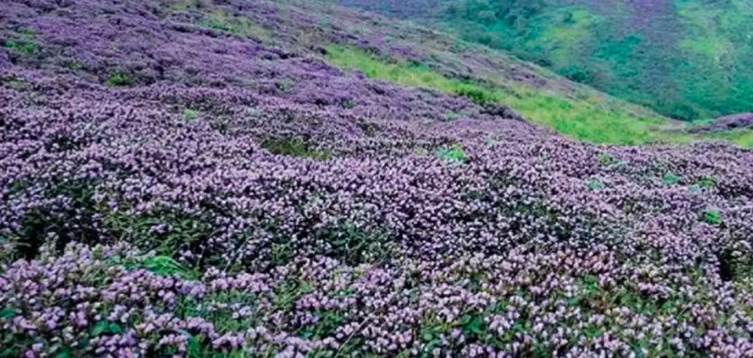Nilgiris: Neelakurinji (Strobilanthes kunthiana)
This is a collection of articles archived for the excellence of their content. |
Contents |
What is Neelakurinji?
Rohan Premkumar, December 20, 2017: The Hindu

From: Giji K. Raman, April 24, 2018: The Hindu

From: Rohan Premkumar, December 20, 2017: The Hindu
The flower, also called Neelakurinji and special to the western ghats, especially The Nilgiris, has a 12-year flowering cycle. In Tamil Nadu, less than 10% of the total number of Strobilanthes plants remain, as most of the grasslands where they occur have been destroyed because of the establishment of tea estates and introduction of invasive species, he notes with concern.
Swathes of shola grasslands in the blue mountains are likely to hit a purple patch with the expected mass blooming of kurinji flowers (Strobilanthes kunthiana) by winter 2018.
Blooms in 2021
Dec 13, 2021: The Times of India

From: Dec 13, 2021: The Times of India
Neelakurinji, known as Strobilanthes kunthiana, bloomed in Biligiri Ranganathaswamy Temple (BRT) Tiger Reserve this year. - Photos by Karnataka forest department
Neelakurinji blooms once in 12 years.
The blooming rare bluishpurple flower makes for a spectacular view, attracting a large number of visitors, although entry to the reserve is restricted.
This flower has been in bloom for two weeks in a large area of Chamarajanagar district hill range of Byluru and Punajur.
The flower has been seen also in the hill ranges of Honnametti and Bedaguli estates.
After the government declared BRT a tiger reserve, the forest department restricted the entry of visitors to enjoy this rare sight.
Earlier, the flower used to bloom in Kodagu and Bababudangiri hills in Chikkamagaluru district too.
This flower is believed to have medicinal value.
As in 2024
Trends Desk, Sep 27, 2024: The Indian Express
The Nilgiri Hills in Tamil Nadu are currently witnessing an extraordinary phenomenon that happens only once every 12 years – the blooming of the beautiful Neelakurinji flowers. The natural event is drawing the attention of nature lovers and travellers from around the globe. Supriya Sahu, an Indian Administrative Service (IAS) officer, posted mesmerising visuals of the Neelakurinji flowers on X, capturing the attention of many.
Sahu, sharing the photos and a video, wrote on X: “Kuttan a Toda tribesman sits proudly among the blooming Neelakurinji flowers in Nilgiris. Flowers of Neelkurinji bloom once in 12 years cycle. It is said that Nilgiris gets its name due to the magical blue hue imparted by these stunning flowers. Neelakurinji Strobilanthes kunthiana has most recently been assessed for The IUCN Red List of Threatened Species in 2024 and listed as Vulnerable emphasising the need for its conservation.”
With 34,600 views and 1,300 likes, Sahu’s post is garnering a lot of attention. Responding to it, one user commented, “It’s high time we also research and speak about how climate change might impact the blooming process. Blooming once in 12 years might make the job all the more difficult.”
Another user asked Sahu, “Which are the best areas to see these Bloom?” She replied saying, “It blooms in many parts of the district, mostly in upper reaches.” A third user wrote, ‘These rare flower species should be protected by all means.”